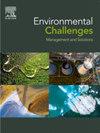不同有机改进剂对水草Cd和Pb生物利用度、吸收和生长的影响
Q2 Environmental Science
引用次数: 0
摘要
酸性土壤重金属污染对作物生长和粮食安全构成潜在威胁。有机改良剂可以降低金属毒性,改善土壤;然而,它们的相对有效性尚未得到很好的界定。本试验评价了甘蔗垃圾生物炭、鸡粪生物炭、废茶渣和蛋壳粉4种有机改良剂改善土壤性质、降低Cd和Pb生物有效性、促进水菠菜生长的效果。盆栽试验采用Cd (18 mg kg-1)、Pb (1125 mg kg-1)或两者均污染的土壤,改良率为5%。鸡粪生物炭处理对土壤有机质、阳离子交换量、孔隙结构、比表面积和必需养分(N、P、Fe)含量的改善效果最好,为植物生长提供了有利条件,并减缓了金属的流动性。它使dtpa可提取的Cd和Pb分别减少62%和89%,并增加了金属从不稳定形态向不稳定形态的转化。其高孔隙率、高官能团、高铁量和高碱度比其他改性剂更有利于金属吸附、共沉淀和络合。结果表明,土壤对Cd和Pb的吸收分别减少了92%和74%,生物浓度和转运因子显著降低。由于毒性减轻和养分有效性提高,茎部和根部生物量分别增加了22倍和15倍。其他改良措施也改善了土壤质量,减少了金属的吸收,但程度较轻。综上所述,鸡粪生物炭是修复金属污染酸性土壤最有效和可持续的改良剂。本文章由计算机程序翻译,如有差异,请以英文原文为准。

Role of different organic amendments on Cd and Pb bioavailability, uptake, and growth by Ipomoea aquatica
Heavy metal contamination in acid soil is a potential risk for crop growth and food security. Organic amendments can decrease metal toxicity and ameliorate soil; however, their comparative effectiveness has not been well defined. This experiment evaluated the effectiveness of four organic amendments, including sugarcane trash biochar, chicken manure biochar, used tea waste, and eggshell powder, in improving soil properties, reducing Cd and Pb bioavailability, and promoting the growth of Ipomoea aquatica (water spinach). A pot experiment was conducted using soil contaminated with Cd (18 mg kg-1), Pb (1125 mg kg-1), or both, with a 5 % amendment rate. Chicken manure biochar exhibited the best improvement on soil organic matter, cation exchange capacity, pore structure, specific surface, and essential nutrient contents (N, P, Fe), contributing favorable conditions for plant growth and mitigating metal mobility among all treatments. It decreased DTPA-extractable Cd and Pb by 62 % and 89 %, respectively, and increased metals’ conversions from labile to less labile forms. Its high porosity, functional groups, Fe amount, and alkalinity contributed to promoting its metal adsorption, co-precipitation, and complexation over other amendments. Consequently, shoot Cd and Pb uptakes were decreased by 92 % and 74 %, respectively, and significantly reduced bioconcentration and translocation factors were found. The shoot and root biomasses were increased up to 22- and 15-fold, respectively, due to toxicity alleviation and benefits derived from better nutrient availability. Other amendments also improved soil quality and reduced metal uptake but to a lesser extent. Overall, chicken manure biochar was the most effective and sustainable amendment to remediate metal-contaminated acidic soils.
求助全文
通过发布文献求助,成功后即可免费获取论文全文。
去求助
来源期刊

Environmental Challenges
Environmental Science-Environmental Engineering
CiteScore
8.00
自引率
0.00%
发文量
249
审稿时长
8 weeks
 求助内容:
求助内容: 应助结果提醒方式:
应助结果提醒方式:


